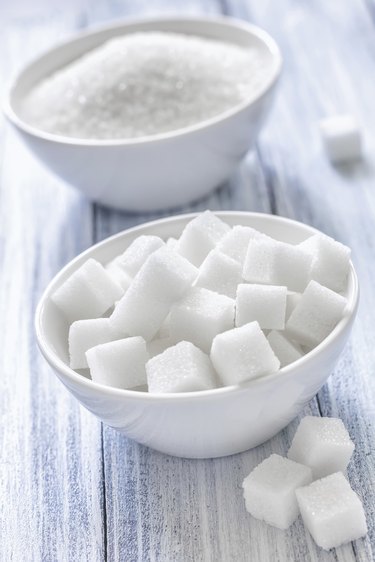
Sugar, a quickly digested simple carbohydrate, contains 4 calories per gram and provides no essential nutrients. Like adults, teens should limit their daily intake of sugar, especially sugars added during processing to foods such as sodas, candies, pastries and snacks.
Recommended Sugar Limits
Video of the Day
The American Heart Association recommends that women consume no more than 100 calories per day, or about 6 tsp., of added sugar. Men should consume no more than 150 calories per day, or about 9 tsp., of added sugar. The American Heart Association does not recommend specific sugar limits for children or teenagers, but teens are not exempt from the negative health effects of excessive sugar consumption. Teens should try to limit their sugar intake as much as adults, and teens who need fewer calories than adults should reduce their intake of empty calories and added sugar accordingly.
Video of the Day
Health Effects of Excess Sugar
Consuming too much sugar can contribute to caloric excess and weight gain, increasing your risk for obesity and obesity-related diseases, including Type 2 diabetes, insulin resistance or pre-diabetes, metabolic syndrome and heart disease. In a 2011 study published in the journal "Circulation," Emory University researchers found that teens with the highest intake of added sugars had increased signs of insulin resistance, a common precursor to diabetes. These teens also had lower levels of HDL, or "good," cholesterol, higher levels of LDL, or "bad" cholesterol and higher levels of triglycerides. These factors may increase the risk for heart disease later in life.
Average Teen Sugar Intake
Unfortunately, most teens consume far too much sugar. Data from the National Health and Nutrition Survey shows that the average teenager consumes 119 g, or about 28.3 tsp., of added sugar per day, note researchers at Emory University. This sugar intake represents 476 calories, or about 21.4 percent of an average teenager's total caloric intake.
Added vs. Naturally Occurring Sugar
The American Heart Association's recommended sugar intake limits apply only to added sugars, not naturally occurring sugars. Sugar occurs naturally in fruits, vegetables and whole grains. These foods provide many important nutrients and represent an important part of a healthy diet. Processed foods and sweetened sodas packed with added sugars provide little or no nutritional benefit, on the other hand. To check for added sugars in foods, look for ingredients such as high fructose corn syrup, fruit juice concentrates, honey, syrup, molasses, sucrose, maltose, fructose and cane sugar.